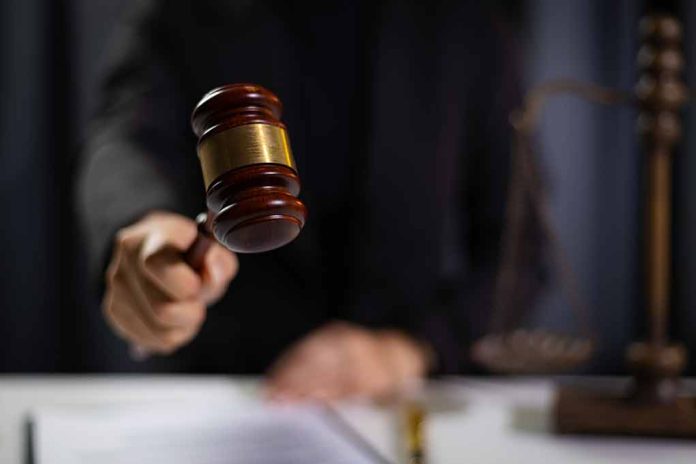
The Department of Homeland Security’s ‘Election Threats Task Force’ faces a lawsuit over alleged election influence and free speech violations, raising concerns about federal overreach in election matters.
At a Glance
- DHS’s Election Threats Task Force is accused of potentially influencing elections and infringing on free speech
- The task force has secured nine convictions related to threats against election officials
- Critics argue that the task force’s actions could compromise democratic values
- The lawsuit raises questions about the balance between election security and civil liberties
Lawsuit Challenges DHS Task Force
A lawsuit has been filed against the Department of Homeland Security’s (DHS) ‘Election Threats Task Force,’ alleging that the initiative could potentially influence elections and infringe on free speech rights. The plaintiffs, including individuals affected by the task force’s actions, argue that the measures taken by DHS could be used to sway election outcomes by targeting specific candidates or viewpoints.
At yesterday's Election Threats Task Force meeting, Deputy AG Monaco announced the Department will seek enhanced sentences in cases where advanced technologies like #ArtificialIntelligence have emboldened individuals to threaten election workers & the integrity of our elections. pic.twitter.com/FoFr5W6B4g
— U.S. Department of Justice (@TheJusticeDept) May 14, 2024
This legal challenge comes amid growing concerns about federal overreach in election matters and the potential risks to democratic values. The case has sparked a debate about the delicate balance between protecting election integrity and safeguarding civil liberties.
Task Force Achievements and Criticisms
The Justice Department’s Election Threats Task Force, created in June 2021, has made significant strides in addressing threats against election officials. According to recent reports, the task force has secured nine convictions and charged 14 cases related to threats against the election community.
“A functioning democracy requires that the public servants who administer our elections are able to do their jobs without fearing for their lives,” said Attorney General Merrick B. Garland. “The Justice Department will continue to investigate and prosecute those who target election officials and election workers as part of our broader efforts to safeguard the right to vote and to defend our democracy.”
However, critics argue that the task force’s actions may be overreaching and potentially infringing on free speech rights. Some legal experts point out that only direct and explicit threats of violence are prosecutable, raising questions about the scope of the task force’s activities.
Balancing Security and Freedom
The lawsuit against the DHS task force highlights the ongoing challenge of balancing election security with the protection of civil liberties. While the task force aims to safeguard election officials and the democratic process, concerns have been raised about its potential impact on free speech and the possibility of influencing election outcomes.
During yesterday’s Election Threats Task Force meeting, AG Garland noted DOJ’s accelerated #ElectionSecurity efforts to combat the increase in threats against election workers, officials, and volunteers. pic.twitter.com/YfIGWxuZJ2
— U.S. Department of Justice (@TheJusticeDept) May 14, 2024
“Election officials by and large have no confidence that if something were to happen to them, there would be any consequences,” said Amy Cohen, the executive director of the National Association of State Election Directors. “It is very clear that we are not seeing a deterrent effect.”
This statement underscores the complex nature of the issue, as election officials express concerns about their safety while others worry about potential overreach by federal agencies.
Broader Implications for Election Integrity
The lawsuit against the DHS task force comes at a time when election security is a top priority for federal agencies. In 2017, DHS designated election infrastructure as critical infrastructure following concerns about foreign interference in the 2016 U.S. Presidential Election.
As the legal battle unfolds, it will likely have significant implications for how federal agencies approach election security in the future. The outcome of this lawsuit could shape the delicate balance between protecting the integrity of elections and preserving the fundamental rights of free speech and political expression.
Looking Ahead
As the 2024 election cycle approaches, the resolution of this lawsuit will be crucial in determining the role of federal agencies in election security. Regardless of the outcome, it is clear that maintaining public trust in the electoral process while safeguarding civil liberties will remain a significant challenge for policymakers and election officials alike.
Sources
- Justice Department’s Election Threats Task Force Secures Ninth Conviction
- Election workers worry that federal threats task force isn’t enough to keep them safe
- EPIC v. DHS (Election Cybersecurity)
- Election Security






